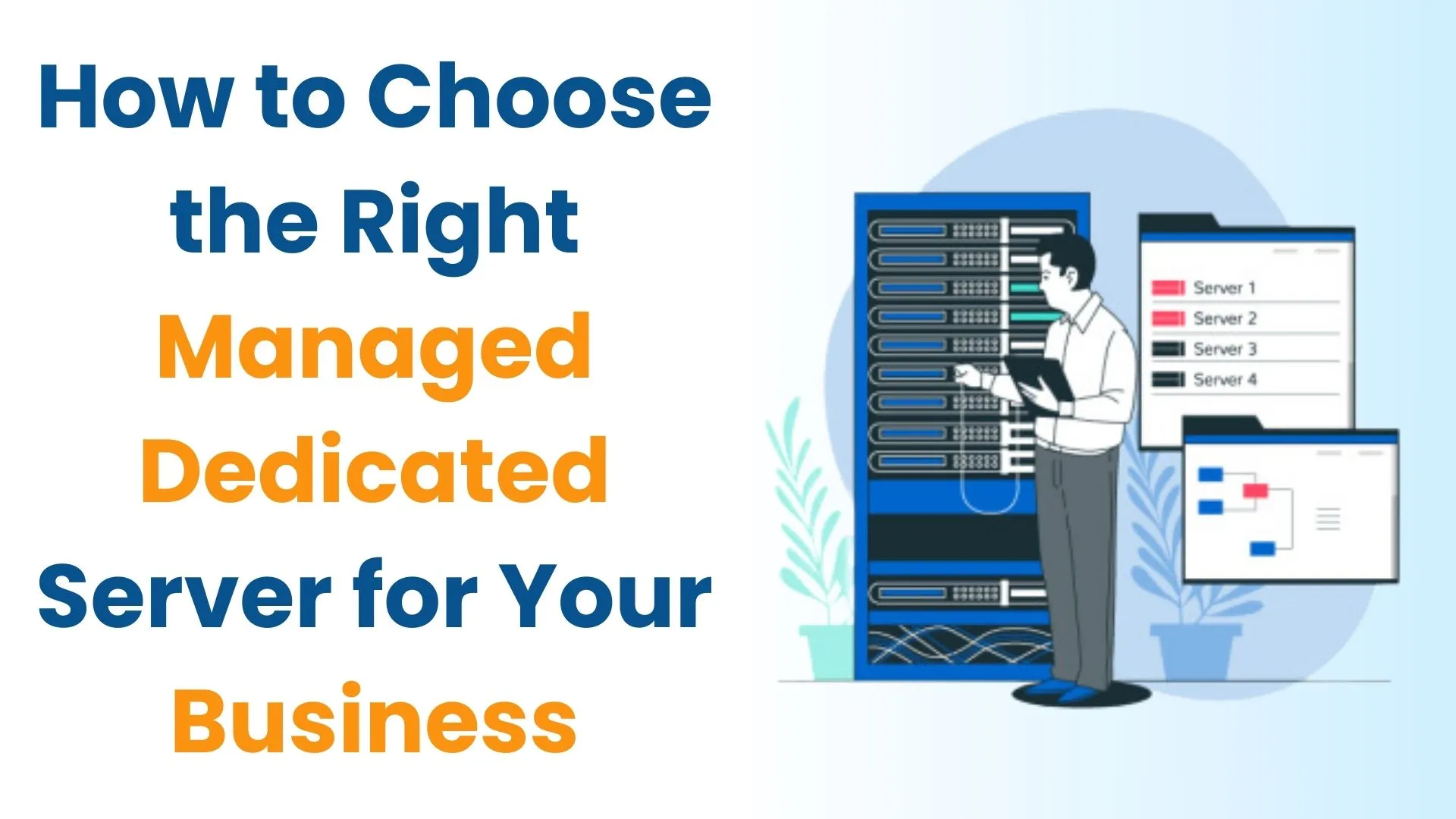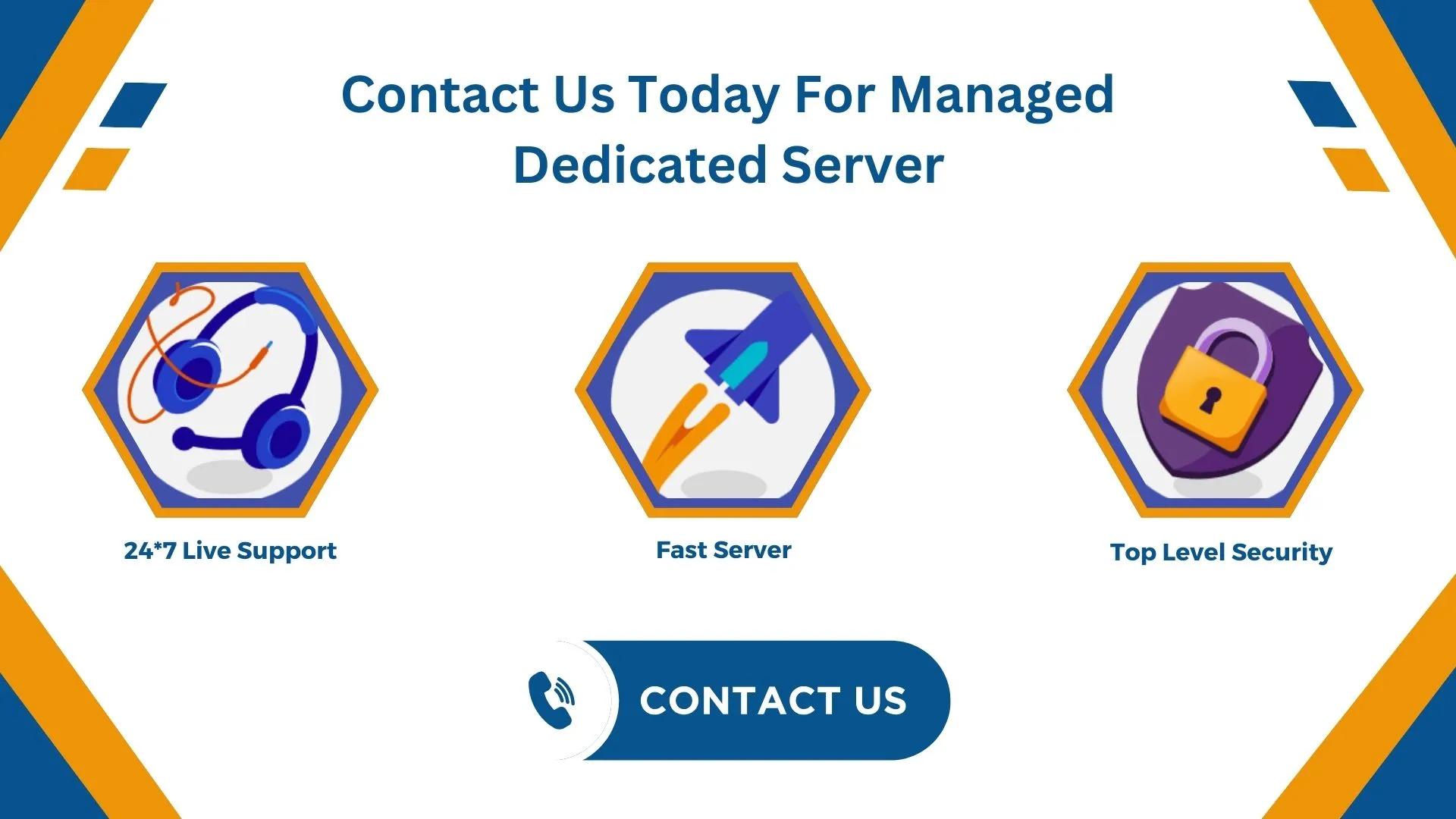
Before getting down to the technicalities of a managed dedicated server and how it figures in web hosting services, let’s take a scenario.
Imagine you’re planning to rent a new store in a high-market, high-volume neighborhood for your luxury brand. You wish to turn it into a million-dollar business in months.
So here is a question: with such an ambitious business plan, can you afford to worry about a broken window, floor cleanliness, malfunctioning switches, or some other shop owner hanging around your inventories?
If your answer is “NO”, then you should ask your next web hosting service provider for a managed, dedicated server for your online business needs.
What is a Managed Dedicated Server?
A managed dedicated server is like renting a whole house for yourself, but with someone else taking care of all the maintenance stuff.
You rent the entire (web hosting) server just for yourself and you get to use it for your online business alone, without sharing space with anyone else. But what’s the best part?
You don’t have to stress about managing the server because the hosting service provider does it for you. Your service provider handles all the technical stuff like keeping the server running smoothly, installing updates, and ensuring everything stays secure.
So, why is this awesome? Well, think about it this way: you can focus all your energy on your business or website without getting bogged down by server headaches.
So if you’re impressed by these benefits, let’s discuss the types, bigger benefits, and, finally, factors to help you choose the best-managed dedicated server for your business.
Types of Servers in Web Hosting
1. Shared Hosting
Shared hosting allocates resources among multiple websites on a single server, offering a cost-effective solution for beginners. However, it may lead to slower performance during traffic spikes due to resource sharing.
Pros
It is cost-effective, easy to set, beginner-friendly, and often includes helpful tools and features.
Cons
Limited resources, potential performance issues during traffic spikes, and less control over server configuration.
2. VPS Hosting
VPS hosting partitions a physical server into multiple virtual servers, providing each website with its dedicated resources. It offers greater customization and control compared to shared hosting, making it suitable for growing websites with moderate traffic.
Pros
More control and customization, scalable resources, better performance, and reliability compared to shared hosting.
Cons
More expensive than shared hosting, limited by physical server resources, requires technical knowledge for management.
3. Dedicated Server Hosting
Dedicated hosting grants exclusive access to a physical server, offering maximum performance and security. It requires technical expertise for server management and comes at a higher cost, making it ideal for large-scale websites or applications with high traffic.
Pros
Maximum performance and security, full control over server configuration, no resource sharing with other users.
Cons
Higher cost compared to shared and VPS hosting requires technical expertise for management and maintenance.
4. Cloud Hosting
Cloud hosting utilizes a network of virtual servers to deliver scalable and flexible hosting solutions. It offers resources on-demand and reduces downtime by distributing website data across multiple servers. Cloud hosting is suitable for businesses requiring high availability and dynamic resource allocation.
Pros
Scalable resources, high availability, pay-as-you-go pricing model, flexibility to scale resources as needed.
Cons
It may be more expensive than traditional hosting for certain usage patterns, and potential security concerns with shared infrastructure.
5. Colocation Hosting
Colocation hosting allows businesses to place their own servers in a data center facility, providing access to high-speed internet and power infrastructure. The data center offers physical security and environmental controls, while the website owner retains control over hardware and software configurations.
Pros
Full control over hardware and software, access to high-speed internet and power infrastructure, enhanced physical security, and environmental controls.
Cons
Requires upfront investment in server hardware, ongoing maintenance and management responsibilities, and potential for higher costs compared to traditional hosting.
Top 3 Benefits of Managed Dedicated Server
1. Exclusive Resources
Picture having a nice kitchen but having to share it with one of your neighbors. Doesn’t feel that good, does it? This leaves you worrying about running out of food items that you want for yourself. That’s one thing that usually happens when you are running your website on shared hosting
With a managed dedicated server, you have the whole kitchen to yourself. You can use all the resources, like power and space, without worrying about others using them too. In shared hosting, everyone has to share the same resources, which can cause issues when one person needs more than the others.
2. Enhanced Performance
With a managed dedicated server, you can fine-tune server configurations, allocate resources efficiently, and implement advanced caching mechanisms. These optimizations not only result in faster loading times but also ensure that your website can handle spikes in traffic without breaking a sweat.
Moreover, the dedicated nature of the server means you won’t be competing for resources with other websites, eliminating potential bottlenecks and maximizing output. This is particularly crucial for websites with high traffic volumes or complex applications that demand consistent performance.
Read more,
What Is VPS Hosting? Why It Might Be the Best Option for Your Site
What Is Data Leakage And How To Prevent It?
Secrets of High-Performance Hosting: Strategies to Supercharge Your Website Speed
12 Benefits of Having Tally on Cloud Server for Small Businesses
Power and Control: 7 Essential Features of Dedicated Hosting
Additionally, the enhanced performance offered by a managed dedicated server can have a direct impact on your search engine rankings.
Search engines like Google prioritize websites that deliver a seamless user experience, including fast loading times and responsive design.
By leveraging the power of a dedicated server, you can significantly improve your site’s SEO performance and visibility.
3. Top-Notch Security
Managed dedicated servers offer a comprehensive suite of security measures akin to having an elite security detail for your online assets.
These servers boast advanced security protocols, including frequent software updates to patch vulnerabilities and fortify defenses against emerging threats.
Robust firewalls are deployed to scrutinize incoming and outgoing traffic, blocking unauthorized access attempts and thwarting malicious intrusions.
Furthermore, managed dedicated servers employ sophisticated malware detection and eradication tools, conducting regular scans to identify and neutralize any potential threats lurking within your server environment.
These proactive measures not only prevent data breaches but also safeguard sensitive information from falling into the wrong hands.
6 Factors to Consider When Choosing A Managed Dedicated Server
1. Understand Your Business Needs First
Before getting into the technical details of server specifications, start by thinking about what your business actually needs.
Consider things like how many people might visit your website, how complex your website is, and how important security is to you.
Also, decide if you want someone else to handle managing the server or if you want to do it yourself based on how good you are with technical stuff.
2. Read the Server Specifications Better
Next, take a good look at what the server can do to make sure it’s a good fit for your business. Think about things like how fast it can process information (CPU), how much memory it has (RAM), how much space it has to store stuff (storage), and how much data it can handle at once (bandwidth).
Make sure it can handle your current needs and still grow with your business.
3. Security Matters
Keeping your website safe from hackers is important. Check out what security features the server provider offers, like firewalls and ways to spot intruders.
You might also want to think about extra security measures like getting special certificates (SSL) or using virtual private networks (VPNs) to keep your data safe.
4. How Reachable is Customer Support?
Even when it’s a managed server, things do tend to spiral out of hand when the traffic to your website fluctuates or because of lingering cyber security threats.
So, it’s good to know that someone’s got your back if things go wrong. Check if the provider offers things like keeping an eye on your server, fixing security problems, and making backups of your data.
Also, make sure they’re available to help you out 24/7, whether it’s through chat, phone, or email.
5. Server Location Matters Too
Believe it or not, where your server is located can make a big difference in how fast your website loads. Pick a place for your server that’s close to where most of your visitors are to make sure they get a speedy experience.
Also, see if the provider has a good network setup to keep things running smoothly.
6. Factor in the Costs
Finally, conduct a thorough assessment of the server’s pricing structure and its components. Compare the costs across different providers and scrutinize any supplementary fees for services such as advanced technical support or specialized software.
Examine the terms of service agreements meticulously to ensure they are in line with your business needs, encompassing details like uptime assurances and support stipulations.
Conclusion
Selecting the right managed dedicated server involves a careful consideration of various factors tailored to your business needs. From evaluating server specifications to prioritizing security and support, each aspect plays a crucial role in ensuring optimal performance and reliability. By understanding your requirements, analyzing server features, and assessing support options, you can make an informed decision that aligns with your business objectives. Remember, investing time in choosing the right managed dedicated server now can lead to long-term benefits, including enhanced performance, robust security, and scalable solutions tailored to your business growth.
 Register
Register

